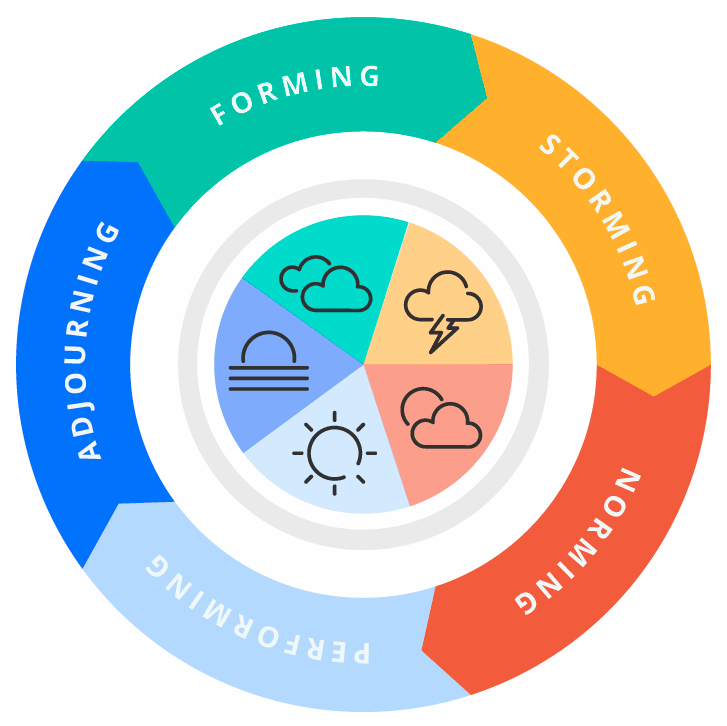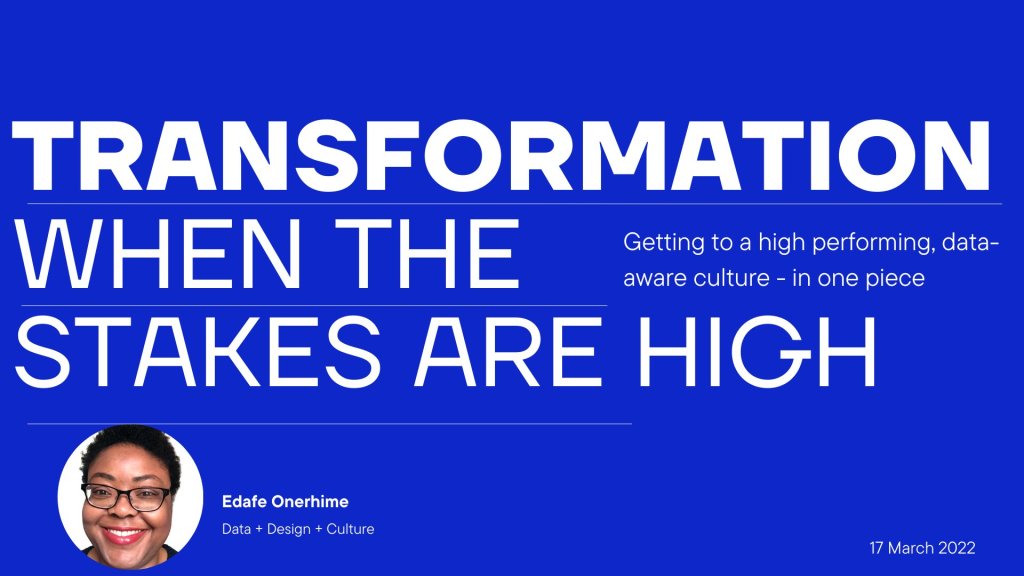Transformation When the Stakes Are High – Getting to a High Performing, Data-Aware Culture – in One PieceDownload
Hello!
- Hello, I’m Edafe Onerhime and I’m so happy to be here.
- Today, I share my journey in data governance: building and leading high performing, data-aware cultures that deliver transformative business outcomes from investment in data and AI, sustainably.
- I love talking about data, design, and culture when we’re having a conversation.
- This is a collaboration. Use the chat feature to ask questions and let me know what you’re thinking.
- I’ll be asking questions too – and not just to make sure you’re awake!
We Live in Interesting Times

- “There is a curse. They say: May you live in interesting times.” – Terry Pratchett, Interesting Times
- The turmoil in the world right now (post-pandemic rebuilding, economic disruption, military action) can be seen, as in this mythological curse, as both a challenge and an opportunity – a time when the stakes are high.
- And I say this, as someone who has been deeply affected by recent events. Family bereavement, uncertainty, illness – I don’t take any of these things lightly. They can, however, be a signal of or for change.
- A chance to make things right.
Who am I?

- My name is Edafe. You can practice pronouncing my name and discover my pronouns (she/her) at http://name.pn/edafe-onerhime
- I’m a technologist and data specialist, speaker, mentor, coach, and author with 25 years of experience in technology.
- My focus is making an impact with data: data strategy, data governance, and data standards.
- My motto is Data + Design + Culture. 🎗️
- I’m passionate about data leadership.
- I lead data governance in a global financial institution.I live in Glasgow, Scotland with my wife and cat, Fergus 🐾
- In the next 30 minutes, I’ll share how I came to lead high performing teams, build data-aware cultures, when the high-stakes are high, sustainably by reducing burnout.
Disclaimer ℹ️
- Everything I share is about my personal journey.
- It doesn’t reflect the views of my employer nor the organisations I have relationships with.
- You can get in touch with me on twitter @ekoner or LinkedIn.
- I can’t promise to answer every question or reply to every message. I’m always happy to hear from you and share with my networks, with your permission.
What does this mean?

- Before I dive into why you’d want high performing teams who are data-aware, I want to make sure you understand how I use these words.
- Matt Abrahams, professor of communications at Stanford University, says: “Never lose your tour group“.
- This advice was the most important takeaway fro om his years leading tour groups around Stanford’s massive campus.
- And these words still resonate for anyone giving a talk. They are also important for people who care about data and culture – what do the words we use mean and how do the people around us understand them?
- Let’s talk definitions.
Data
- There are many definitions of data and most people vaguely have an idea of what data is – or are. I’m agnostic.
- For me, data (in a business context) is anything we care enough about to record in analogue or digital form.
- It can include text and numbers, facts and figures, bits and bytes, representing images, sounds, and tangible or intangible objects.
- At the level I work, data and information are tightly aligned. This might be different in your context or at your organisation.
- When talking with others about data, it’s useful to define what data means for you.
Data Governance
- I see data governance, then, as how we plan, control, and get oversight of data used in our organisations.
- That means not just having good standards for control, but planning how we implement and use policies, put into place procedures to help us have better control.
- Governance can sound like a barrier, even though we might intend for it to be guardrails. So we must also consider adding speed boosts – ways to make it fast, easy, and pain-free for people to do the right thing.
- That might mean learning and development, roles like data stewards to enforce rules and data champions to advocate for better data. It might mean embedding policy and rules into our tools to make life easier.
- And finally, we need oversight, so we know what people are doing (rightly or wrongly) with data and the impact our efforts are having on our mission, people, and culture.
- With good data governance, you have useful, usable data that’s widely in use.
- In other words, good data governance can lead to a data-aware culture.
- A high-performing culture can also make it easier to embed good data governance – more on that later.
Transformation

- Transformation is change – on steroids. To transform, is to make radically different.
- No wonder change can become a word that strikes fear in the heart of people trying to get the work done.
- Not again! Not yet another change.
- Transformation can give us huge benefits but it comes at a cost.
- I’ll come to why that cost doesn’t always pay off, and what I’ve learnt about balancing the scales.
High Stakes
- Let’s end with high stakes – involving serious risks in case of failure.
- The pandemic was a high-stakes global event. Everything shut down in a way we hadn’t seen in modern times.
- You could go as far as saying the pandemic was transformational.
- It certainly got people thinking about how they live and work.
- Overnight, many of us began to work from home – or live at work as some people coined it.
- Some people found immense freedom while others found it hellish – sometimes even the same people at different points
- What was the one thing the pandemic drove home for me? That a lot of the reasons we shy away from change are less concrete than I’d originally thought.
- It also showed me the benefit of embracing a risky move and how to manage and build on high stakes implementations in my professional practice.
- The question that coalesced for me is: How might we take advantage of high stakes events to build data governance and the cultures that support them? This brings us full circle (and hopefully together) to the rest of today’s journey together – Getting to a High Performing, Data-Aware Culture – in One Piece.
- What did the pandemic drive home for you?
Why does this matter?
- Why would recent events change my professional practice?
- When it comes to data governance, I’ve been fairly risk-averse.
- I’m not a fan, for instance, of buying tools to fix people-shaped problems. Investment in data and AI is expensive, so I like to approach the problems of implementing and sustaining good data, thoughtfully.
- This isn’t to say I don’t personally take risks. After nearly 15 years at the front line of technology as a database developer, data architect, full-stake Business Information specialist, I went back to university to read a masters in Business Intelligence full time. No income, no promise of a job on the other end. Big risk, big reward.
- Prior to that, I quit my job in Bolton and moved to Leeds in Yorkshire on 3-month contract to start afresh. Again, big risks, massive rewards – I met my wife in Leeds.
- I moved to Glasgow, Scotland from Yorkshire to head data in a central government department after years of consulting. Less of a risk, but definitely a pay cut.
- In my personal life, I’m a planner and a perfectionist. I constantly have to remind myself that things can be “good enough”.
- My wife teases me that when we go on holiday, I have everything planned – we will have fun between 2 and 4. It’s true!
- So the pandemic for me, represented what the economists behind Freakonomics call a natural experiment. One in agility.
- Reader, I was not agile and I burned out.
- As I recovered, I started to think about resilience, agility, and burn out in a whole different way.
- And that brings me to why high stakes and high performing teams can be a game changer for data governance.
- Let’s take a look at some of the stakes.
The cost of transformation
- The cost of tranformation is high but the outcomes are mixed.
- A survey of 85 Fortune 1000 or industry leading companies found 99% of companies invested in data and AI but only 29.2% reported transformational outcomes.
- The Journey to Becoming Data-Driven: A Progress Report on the State of Corporate Data Initiatives, does have a small sample size, so apply the appropriate level of scrutiny.
- It aligns with my own findings, however, remember: “We find comfort among those who agree with us – growth among those who don’t.” – Frank A. Clark.
- Bias is real and your own context in your own organisation is the most important measure to consider.
- So how might we do better?
How might we do better?

DovileMi
- In 1965, Bruce Tuckman coined the phrase “forming, storming, norming, and performing”.
- His paper, “Developmental Sequence in Small Groups.”, describes the steps a team takes from starting as strangers to performing effectively – the basis of a high performing team.
- A high performing team is one that delivers consistently at a high level. They are aligned, diverse, and inclusive, with strong values of trust and respect. They communicate and adapt well, by focusing on engagement, healthy conflict, and communication. This creates a sense of psychological safety and supports flexible, innovative, and agile decision making.
- As I started learning about high performing teams, I saw alignment between the culture that produces and sustains them with the culture needed for data awareness.
- A data-aware culture has cultural alignment, operates with trust, provides democratic access to data and insights, encourages agile use of data to support decision-making and has appropriately literate employees – people who can read, understand, interpret, find, and argue with data.
- To get to a data-aware culture, one route is to align that culture change with producing high performing teams. This culture is one that is resilient when the stakes are high and provides an environment that is sustainable – burnout is reduced.
- And now I’ll leave you with five tips to get from where you are now to nirvana.
- Move fast, don’t break things (or people) – When an opportunity arises to move quickly, take it. When you do so, take care of your people too.
- Plan for alignment, alignment, alignment – multiple streams of change are exhausting for the people experiencing them – how might you better align your efforts? Yes, it’s more work for you, but the pay off is more streamlined delivery.
- Review, reflect, recharge – Reviewing and reflecting are key to learning from the work you’re doing. Afterwards, remember to recharge.
- Be proactive, not reactive – When things are on fire, it can feel impossible to create space to be proactive. Take whatever measures you can to make sure the fires are put out enough to build in foundational work. Work that let’s you be proactive.
- Look at high stakes as an opportunity to experiment – learn, grow, and transform
In closing
Quotes that resonated
We find comfort among those who agree with us – growth among those who don’t.
Frank A. Clark
Culture is the name for what people are interested in, their thoughts, their models, the books they read and the speeches they hear .
Walter Lippmann
If I have seen further, it is by standing on the shoulders of giants.
Isaac Newton
Reading and watching that shaped this talk.
- Interesting Times: http://www.isfdb.org/cgi-bin/title.cgi?270
- How to pronounce my name: https://name.pn/edafe-onerhime
- Twitter: https://twitter.com/ekoner
- LinkedIn: https://www.linkedin.com/in/ekoner/
- Matt Abrahams: “How to Make Your Communication Memorable”: https://www.youtube.com/watch?v=Fsr4yrSAIAQ
- Journey to Becoming Data-Driven: A Progress Report on the State of Corporate Data Initiatives: https://iscdo.org/the-journey-to-become-data-driven-a-progress-report/
- Developmental Sequence in Small Groups: https://web.mit.edu/curhan/www/docs/Articles/15341_Readings/Group_Dynamics/Tuckman_1965_Developmental_sequence_in_small_groups.pdf
- Data Tells Us That A Data Culture Matters: https://www.forbes.com/sites/googlecloud/2020/09/17/data-tells-us-that-a-data-culture-matters/?sh=42bc9c237c13
- 14 Characteristics Of High-Performing Teams: https://www.forbes.com/sites/forbeshumanresourcescouncil/2020/09/16/14-characteristics-of-high-performing-teams/?sh=1ba8107816c6
- Why does culture sometimes evolve via sudden bursts of innovation? https://theconversation.com/why-does-culture-sometimes-evolve-via-sudden-bursts-of-innovation-51092
- Tuckman’s stages of group development (illustration): https://commons.m.wikimedia.org/wiki/File:Team-development-stages.png#mw-jump-to-license
- How six companies are using technology and data to transform themselves: https://www.mckinsey.com/business-functions/mckinsey-digital/our-insights/how-six-companies-are-using-technology-and-data-to-transform-themselves
- Decade Of Investment In Big Data And AI Yield Mixed Results: https://www.forbes.com/sites/randybean/2021/01/03/decade-of-investment-in-big-data-and-ai-yield-mixed-results/
- Pandemic ‘transformative’ for digital health sector: https://www.pinsentmasons.com/out-law/news/pandemic-transformative-for-digital-health-sector
- Digital transformation after the pandemic: https://mitsloan.mit.edu/ideas-made-to-matter/digital-transformation-after-pandemic
- Organisational culture and cultural change (CIPD): https://www.cipd.co.uk/knowledge/culture/working-environment/organisation-culture-change-factsheet


Leave a comment